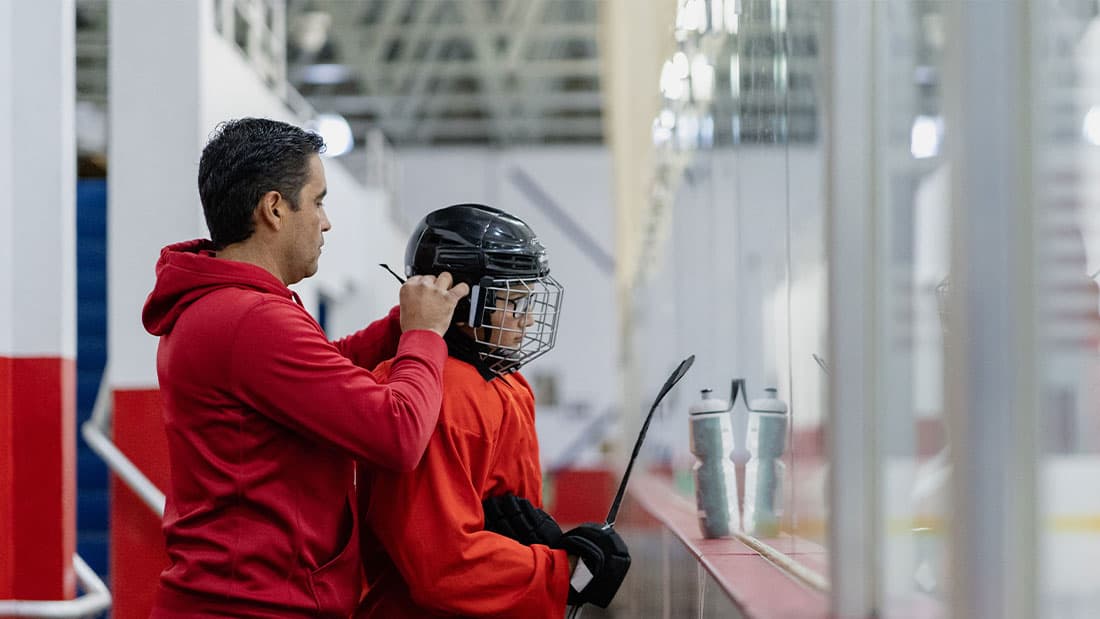How My Volleyball Team Survived a 15-Hour Tournament Day and Just Kept Winning
My Elite club team and I recently traveled to Springfield, Massachusetts for our New England Regional Volleyball Association qualifier tournament. This tournament is much like the numerous in- and out-of-region tournaments club volleyball teams attend throughout their 6-month season. They often consist of three full days of pool play (usually with matches going into three sets), challenge games, work times and more.
Just like the Mid-East Qualifier in Indiana, the Boston Mizuno festival in Massachusetts, Big South in Atlanta and the Northeast Qualifier in Philly, formatting for these tournaments forces teams to win in order to “pool up.” This means, you must continue to win to place well and advance brackets. It can also mean some very long days.
This recent tournament was a true test of our team. We began our first match warm-up on Saturday at 7:30 a.m. We had a full day of matches, with most of them going into a tie-breaker third set, plus numerous work team matches and mandatory challenge games due to bracket ties. In the end, we finished playing our last challenge match at 10:30 p.m.! We went from the bottom of the bronze bracket to earning a top seed in the silver bracket over the course of that incredible, exhausting 15-hour day. It was by far the most intense, exhilarating and nerve-wracking day we’ve had all season. Should such extreme days of competition even be possible? Probably not, but it’s the nature of the beast right now. How did we survive and thrive in spite of it? It’s all in the details.
Setting the tone for the trip starts before you even leave. Travel, flights, hotels and being in a new city with your team is often exciting for the players, which is part of what makes this so fun, but they can also tend to get over-excited and distracted. As a coach, it’s my job to keep them in a competitive state of mind. This means balancing the fun with our one true purpose—competition.
In volleyball, communication on the court is one of the biggest, most important and influential skills a team has at their disposal. These long tournaments are a great chance to create team bonding moments that will carry straight onto the court. If they can enjoy their time off the court together, they will become more comfortable on the court and play harder for one another. It’s a good idea to set rules for your players before you leave for the trip and to organize team meals and activities for the off times during the tournament. When the time comes to play, your team needs to know when to lock it in and compete.
Before the first match, I require my team to perform a full warm-up. This sets the tone and gives them time to change their mental state and get competition-ready. They’ll first complete a dynamic stretch warm-up to warm and loosen their muscles. They’ll then compete in 2-3 fast-paced/multi-touch ball control-type drills to get their heart rates up, their communication rolling, and their reactions and skills up to game-time speed.
Then the matches begin. As the coach, it’s my job to keep them focused during these matches, making proper substitutions and strategic timeouts to give them a competitive edge. Match after match, set after set, sometimes playing two or even three matches in a row, the schedule can be grueling. But inevitably, there will be breaks in play. Taking full advantage of this time is imperative to the long game. I always give my girls a time and court number to meet back at and then issue orders to go eat (hopefully something along the lines of these nine options, because you can’t survive a 15-hour day of competition on nothing but hot dogs) and rehydrate. This is a time they can rest, refuel and hopefully rest their legs. Because when it’s time to play again, I require full focus and attention to the game.
As the head coach, it is my job to interpret my players’ body language, vocal and facial expressions to determine quickly whether or not they should be on the court. With only 12 substitutions allowed per set and only 25 points in each, strategy is key in keeping my team pumped up and ready to rock all the way to the end.
My players, like most kids, will not come right out and tell me that they’re struggling or ask to be subbed out. So, it becomes my job to remove them at the right time to give them a mental and physical break to reset. I’ll first make rotation changes on the court like stacking them out in serve-receive, or tell the setter to set only the hitters who are terminating, but if that doesn’t work, I remove them and take that time to explain to them why I did so. This may re-light that fire and have them itching to get back on the court for redemption. Especially in the last matches of the day, utilizing all subs and timeout is instrumental to our tournament success.
There was a moment that weekend where one of my starting players was struggling. After a successful day of her leading the team in positive stats, she began to falter. Her passing was off, she was missing her serves, and her face was visibly upset. So I took her out. She begged me to immediately put her back on the court, that she was just “having a moment” and could do better, but I said no. I was stern with her, told her to get some water and take a seat. As one of my better athletes, she was visibly upset about being taken out, but as a seasoned coach, I know for a fact that pulling her out and let her regain her focus was the best possible move. After 5 points, I told her to go back in.
Not only did she deliver a perfect pass on her very first touch, she went on to serve 11 points in a row to lead us to victory. Her fire and determination were infectious. The team’s overall attitude followed suit, and the players around her began to forget how tired they felt.
Volleyball tournaments can feel like a physical, mental and emotional gauntlet. To thrive in them, players need to bring the right mindset to the court and focus on re-fueling and resting whenever afforded the opportunity. Coaches need to recognize that fatigue and lapses in focus will happen over the course of a long day, and utilize their substitutions to remedy this issue. You can’t expect to just ride your best players all game, every game. When you play that many games in such a short span, perfection is simply unrealistic. It’s all about remaining resilient through the ups-and-downs and giving your team the best chance to succeed.
Photo Credit: FatCamera/iStock
READ MORE:
RECOMMENDED FOR YOU
MOST POPULAR
How My Volleyball Team Survived a 15-Hour Tournament Day and Just Kept Winning
My Elite club team and I recently traveled to Springfield, Massachusetts for our New England Regional Volleyball Association qualifier tournament. This tournament is much like the numerous in- and out-of-region tournaments club volleyball teams attend throughout their 6-month season. They often consist of three full days of pool play (usually with matches going into three sets), challenge games, work times and more.
Just like the Mid-East Qualifier in Indiana, the Boston Mizuno festival in Massachusetts, Big South in Atlanta and the Northeast Qualifier in Philly, formatting for these tournaments forces teams to win in order to “pool up.” This means, you must continue to win to place well and advance brackets. It can also mean some very long days.
This recent tournament was a true test of our team. We began our first match warm-up on Saturday at 7:30 a.m. We had a full day of matches, with most of them going into a tie-breaker third set, plus numerous work team matches and mandatory challenge games due to bracket ties. In the end, we finished playing our last challenge match at 10:30 p.m.! We went from the bottom of the bronze bracket to earning a top seed in the silver bracket over the course of that incredible, exhausting 15-hour day. It was by far the most intense, exhilarating and nerve-wracking day we’ve had all season. Should such extreme days of competition even be possible? Probably not, but it’s the nature of the beast right now. How did we survive and thrive in spite of it? It’s all in the details.
Setting the tone for the trip starts before you even leave. Travel, flights, hotels and being in a new city with your team is often exciting for the players, which is part of what makes this so fun, but they can also tend to get over-excited and distracted. As a coach, it’s my job to keep them in a competitive state of mind. This means balancing the fun with our one true purpose—competition.
In volleyball, communication on the court is one of the biggest, most important and influential skills a team has at their disposal. These long tournaments are a great chance to create team bonding moments that will carry straight onto the court. If they can enjoy their time off the court together, they will become more comfortable on the court and play harder for one another. It’s a good idea to set rules for your players before you leave for the trip and to organize team meals and activities for the off times during the tournament. When the time comes to play, your team needs to know when to lock it in and compete.
Before the first match, I require my team to perform a full warm-up. This sets the tone and gives them time to change their mental state and get competition-ready. They’ll first complete a dynamic stretch warm-up to warm and loosen their muscles. They’ll then compete in 2-3 fast-paced/multi-touch ball control-type drills to get their heart rates up, their communication rolling, and their reactions and skills up to game-time speed.
Then the matches begin. As the coach, it’s my job to keep them focused during these matches, making proper substitutions and strategic timeouts to give them a competitive edge. Match after match, set after set, sometimes playing two or even three matches in a row, the schedule can be grueling. But inevitably, there will be breaks in play. Taking full advantage of this time is imperative to the long game. I always give my girls a time and court number to meet back at and then issue orders to go eat (hopefully something along the lines of these nine options, because you can’t survive a 15-hour day of competition on nothing but hot dogs) and rehydrate. This is a time they can rest, refuel and hopefully rest their legs. Because when it’s time to play again, I require full focus and attention to the game.
As the head coach, it is my job to interpret my players’ body language, vocal and facial expressions to determine quickly whether or not they should be on the court. With only 12 substitutions allowed per set and only 25 points in each, strategy is key in keeping my team pumped up and ready to rock all the way to the end.
My players, like most kids, will not come right out and tell me that they’re struggling or ask to be subbed out. So, it becomes my job to remove them at the right time to give them a mental and physical break to reset. I’ll first make rotation changes on the court like stacking them out in serve-receive, or tell the setter to set only the hitters who are terminating, but if that doesn’t work, I remove them and take that time to explain to them why I did so. This may re-light that fire and have them itching to get back on the court for redemption. Especially in the last matches of the day, utilizing all subs and timeout is instrumental to our tournament success.
There was a moment that weekend where one of my starting players was struggling. After a successful day of her leading the team in positive stats, she began to falter. Her passing was off, she was missing her serves, and her face was visibly upset. So I took her out. She begged me to immediately put her back on the court, that she was just “having a moment” and could do better, but I said no. I was stern with her, told her to get some water and take a seat. As one of my better athletes, she was visibly upset about being taken out, but as a seasoned coach, I know for a fact that pulling her out and let her regain her focus was the best possible move. After 5 points, I told her to go back in.
Not only did she deliver a perfect pass on her very first touch, she went on to serve 11 points in a row to lead us to victory. Her fire and determination were infectious. The team’s overall attitude followed suit, and the players around her began to forget how tired they felt.
Volleyball tournaments can feel like a physical, mental and emotional gauntlet. To thrive in them, players need to bring the right mindset to the court and focus on re-fueling and resting whenever afforded the opportunity. Coaches need to recognize that fatigue and lapses in focus will happen over the course of a long day, and utilize their substitutions to remedy this issue. You can’t expect to just ride your best players all game, every game. When you play that many games in such a short span, perfection is simply unrealistic. It’s all about remaining resilient through the ups-and-downs and giving your team the best chance to succeed.
Photo Credit: FatCamera/iStock
READ MORE:











